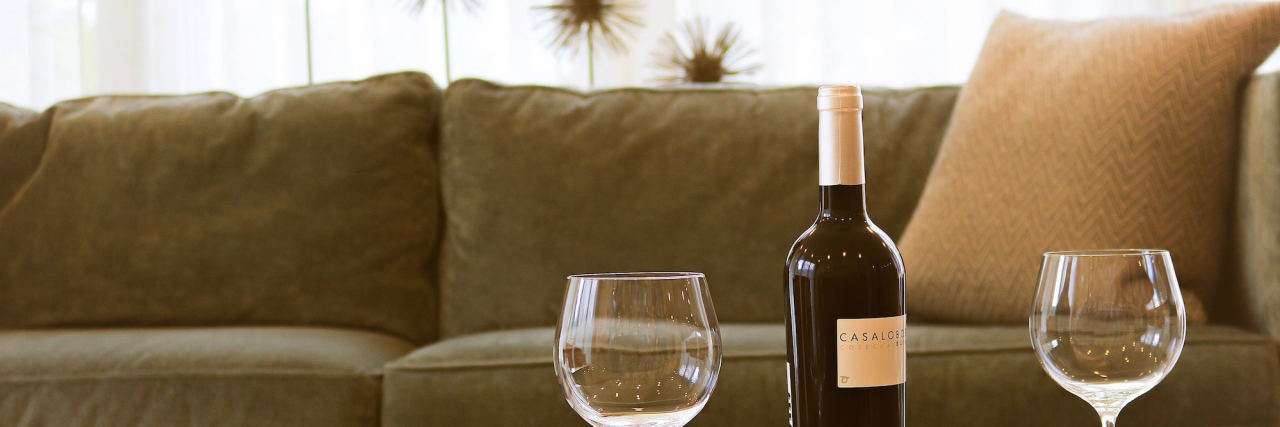You’ve seen them, right? These days I can hardly get on social media without running into an onslaught of “Mommy juice” memes. Pictures of giant wine glasses proclaiming you must drink wine from the bottle because it’s so hard to be a mom these days. You can buy cards, shirts, mugs, wine glasses, framed pictures and just about anything you can think of that proclaim that wine is a must-have for motherhood. It’s always “wine thirty” when the kids go to bed, right? Well, this mom went from those memes to alcoholism.
I drank from a very early age and continued to drink socially into early adulthood. I quit for religious reasons when I was 21. I resumed social drinking about four years later in 2003. I quit again due to pregnancy and kiddo-having in 2005 and pretty much didn’t imbibe until 2009. In 2009, I became a social media user. I joined the masses using Myspace and then Facebook. The memes, or pictures as we all called them back then, began around that time. I saw all kinds of memes, but because I had “liked” so many mom pages, it was wine, wine and more wine. I loved the idea of once my kiddo was in bed, hanging out on the couch with a nice glass (or two) of wine and my Facebook page. This was my special “mommy time” every Friday. Then Saturday. Then Sunday. But because I worked Monday, my Sunday “mommy time” began much earlier. Now I never got “knee-walking drunk” like I did when I was a teenager (sorry, mom!) but I would have just enough to take off the edge, get a nice fuzzy, warm feeling to make myself a bit more confident and social.
In 2009, I incurred some trauma that eventually turned my wine into vodka. Nightly vodka. Sometimes drinking at lunch vodka. I rationalized. I told myself lies. A screwdriver or Bloody Mary in the morning was completely appropriate. I mean, come on, it’s orange juice. Even though I drank every day, it was only because I needed to relax, to decompress after a hard day or cut the anxiety of going back to work after a weekend. I didn’t get drunk, so in my mind, there was no problem. Pfft. It was completely normal. When my husband started making comments and noticing it was becoming a real problem, I began putting it in mugs disguised as coffee. Tumblers disguised as soda. Yeah, coffee with some Bailey’s and coke with some vodka. When my son was 4, he saw beer in the grocery store, pointed to it and said, “Mommy’s cup.” Not too humiliating. He only did it because he saw beer in the fridge, right? And it’s not like I was setting a bad example because I wasn’t getting drunk and we all know that is the only form of over-drinking or alcoholism (Insert eye roll here). Really though, there are people who believe this.
I quit drinking in 2014 after my brother was hospitalized for inebriation. I saw myself in him. The need to fit in, to feel that false rush of confidence, the self-medication. I saw the slippery slope and realized I was starting to lose my footing. He, unfortunately, did not survive alcoholism. I wish I could tell him that his death was not in vain. I share his story whenever I can in hopes that it may save someone’s life or impact them in some positive way.
I don’t blame memes for my alcohol addiction, but I do believe they play a part in desensitization. They made me feel like it was normal. They made it much easier to rationalize. I deserved those drinks because I was a mom and, gosh darn it, I work hard to be a good mom. I felt like I was fitting in where I never really felt that way in real life. Don’t get me wrong, I don’t have an issue with people that drink alcohol, share the memes, whatever. Good for them that they can enjoy a glass of wine or a beer. That just isn’t me. With a genetic predisposition for alcoholism, I should have been smarter and I am certainly teaching my son that when he is old enough, it is very important for him to be self-aware of such things.
Alcoholism is an illness. Just like any other physical, mental ailment. It is nothing to be ashamed of and recovery and sobriety should be celebrated by both the alcoholic and their loved ones. It should be discussed within families and stories should be shared when the alcoholic feels comfortable. If someone else is uncomfortable with your story being shared, that is their problem, not yours. You never know whose life you may change with your story.
If you or a loved one is affected by addiction and need help, you can call SAMHSA‘s hotline at 1-800-662-4357.
We want to hear your story. Become a Mighty contributor here.
Unsplash photo via Guillermo Nolasco

